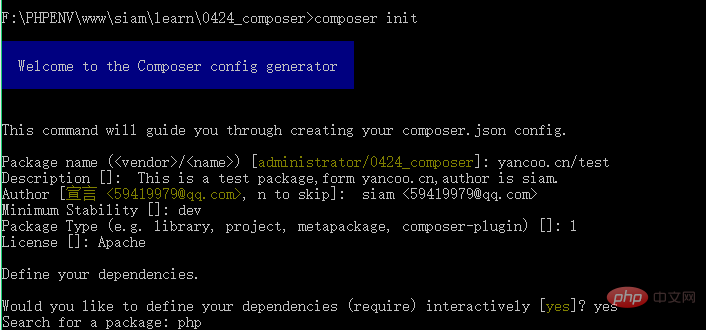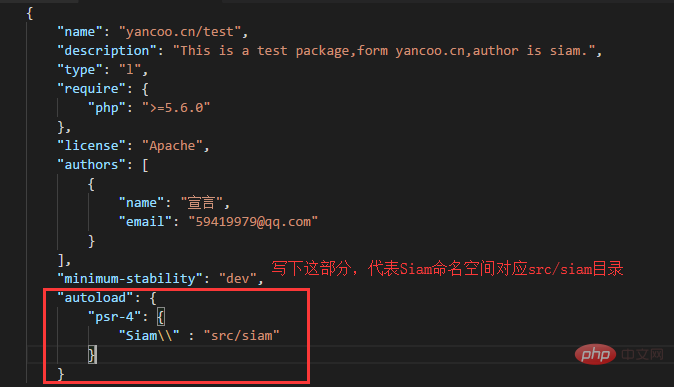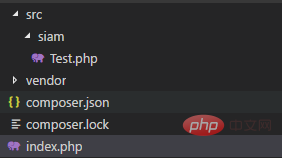How to write composer package
Before introducing how to write the composer package, you can learn how to install composer and its related usage through the composer usage tutorial column.

How to write the composer package?
Write your own composer package
The composer package is suitable for use when you need to cooperate with other dependent packages.
Let’s write our own composer package. First, we create an empty directory and run the following command to initialize a blank composer package
composer init
You can see the return in the command window Tip;
You need to enter the package name
This command will guide you through creating your composer.json config.` Package name (<vendor>/<name>) :
What I wrote here is yancoo.cn/test, press Enter
You need to enter the description
Description []:
Package description content
You need to enter the author
Author [宣言 <59419979@qq.com>, n to skip]:
If there is a default value for this option, you can directly Enter
You need to enter the minimum stable version
Minimum Stability []:
This option has optional values: stable, RC, beta, alpha, dev. Generally fill in dev
Need to enter the package type
Package Type (e.g. library, project, metapackage, composer-plugin) []:
The options are already available in the prompt, we usually choose library and fill in l
Need to enter the open source agreement
License []:
Fill in according to your own situation, we fill in Apache
Set other environments or packages that the package needs to depend on
Define your dependencies. Would you like to define your dependencies (require) interactively [yes]?
If you need to set the dependent environment or For other packages, enter yes and press Enter, which will let you search. We set the php version for the package here to be greater than 5.6, so search for php.
Enter the version constraint to require (or leave blank to use the latest version):
Enter the minimum required version number>=5.6.0

If you need to set multiple environment requirements, repeat the search Just fill it in. If you don’t need it, just press Enter without filling in the content in Search for a package:
Next, set the dependent package
Would you like to define your dev dependencies (require-dev) interactively [yes]?
us No need to press Enter directly.
{
"name": "yancoo.cn/test",
"description": "This is a test package,form yancoo.cn,author is siam.",
"type": "l",
"require": {
"php": ">=5.6.0"
},
"license": "Apache",
"authors": [
{
"name": "宣言",
"email": "59419979@qq.com"
}
],
"minimum-stability": "dev"
}
Do you confirm generation [yes]?Confirm the message, yes and press Enter. Initialization is complete
Do you confirm generation [yes]? yes Would you like to install dependencies now [yes]? yes
The installation is complete. You can see that our directory has generated the following structure.

vendor is the address where composer stores packages. All packages are stored in this path for unified management, and composer provides the function of automatic loading of namespaces. We are using We only need to introduce the unified entry file of composer
require "vendor/autoload.php";
But we also need to write in the configuration file of the package which directory needs to be automatically loaded to be effective!
Edit composer.json file

The path here needs to be determined according to your own, you can also refer to the above writing method .
After writing, you need to run the command line composer dump-autoload to update the composer's namespace and folder mapping relationship.
The previous step is very important. If you miss it, it will not be executed normally.
Then we create the src folder, then create the siam folder, and create the Test.php file in it
Write the namespace Siam; According to the psr-4 specification, the class name must be the same as the file name same.
<?php
//Test.php文件
namespace Siam;
class Test
{
function test()
{
echo "Form Test -> test()";
}
}Write the index.php test file in the outermost layer. The correct way is to create a demo folder and then write the test file.
test();
So our current file directory structure is as follows. Run index.php to get the content correctly. Form Test -> test()

You can customize it according to your own To write classes, you only need to pay attention to the fact that the namespace level is the same as the folder level, and the class name is the same as the file name to load automatically.
The above is the detailed content of How to write composer package. For more information, please follow other related articles on the PHP Chinese website!

Hot AI Tools

Undresser.AI Undress
AI-powered app for creating realistic nude photos

AI Clothes Remover
Online AI tool for removing clothes from photos.

Undress AI Tool
Undress images for free

Clothoff.io
AI clothes remover

Video Face Swap
Swap faces in any video effortlessly with our completely free AI face swap tool!

Hot Article

Hot Tools

Notepad++7.3.1
Easy-to-use and free code editor

SublimeText3 Chinese version
Chinese version, very easy to use

Zend Studio 13.0.1
Powerful PHP integrated development environment

Dreamweaver CS6
Visual web development tools

SublimeText3 Mac version
God-level code editing software (SublimeText3)

Hot Topics
 1655
1655
 14
14
 1413
1413
 52
52
 1306
1306
 25
25
 1252
1252
 29
29
 1226
1226
 24
24
 Use Composer to solve the dilemma of recommendation systems: andres-montanez/recommendations-bundle
Apr 18, 2025 am 11:48 AM
Use Composer to solve the dilemma of recommendation systems: andres-montanez/recommendations-bundle
Apr 18, 2025 am 11:48 AM
When developing an e-commerce website, I encountered a difficult problem: how to provide users with personalized product recommendations. Initially, I tried some simple recommendation algorithms, but the results were not ideal, and user satisfaction was also affected. In order to improve the accuracy and efficiency of the recommendation system, I decided to adopt a more professional solution. Finally, I installed andres-montanez/recommendations-bundle through Composer, which not only solved my problem, but also greatly improved the performance of the recommendation system. You can learn composer through the following address:
 Laravel Introduction Example
Apr 18, 2025 pm 12:45 PM
Laravel Introduction Example
Apr 18, 2025 pm 12:45 PM
Laravel is a PHP framework for easy building of web applications. It provides a range of powerful features including: Installation: Install the Laravel CLI globally with Composer and create applications in the project directory. Routing: Define the relationship between the URL and the handler in routes/web.php. View: Create a view in resources/views to render the application's interface. Database Integration: Provides out-of-the-box integration with databases such as MySQL and uses migration to create and modify tables. Model and Controller: The model represents the database entity and the controller processes HTTP requests.
 Solve caching issues in Craft CMS: Using wiejeben/craft-laravel-mix plug-in
Apr 18, 2025 am 09:24 AM
Solve caching issues in Craft CMS: Using wiejeben/craft-laravel-mix plug-in
Apr 18, 2025 am 09:24 AM
When developing websites using CraftCMS, you often encounter resource file caching problems, especially when you frequently update CSS and JavaScript files, old versions of files may still be cached by the browser, causing users to not see the latest changes in time. This problem not only affects the user experience, but also increases the difficulty of development and debugging. Recently, I encountered similar troubles in my project, and after some exploration, I found the plugin wiejeben/craft-laravel-mix, which perfectly solved my caching problem.
 Laravel framework installation method
Apr 18, 2025 pm 12:54 PM
Laravel framework installation method
Apr 18, 2025 pm 12:54 PM
Article summary: This article provides detailed step-by-step instructions to guide readers on how to easily install the Laravel framework. Laravel is a powerful PHP framework that speeds up the development process of web applications. This tutorial covers the installation process from system requirements to configuring databases and setting up routing. By following these steps, readers can quickly and efficiently lay a solid foundation for their Laravel project.
 How to view the version number of laravel? How to view the version number of laravel
Apr 18, 2025 pm 01:00 PM
How to view the version number of laravel? How to view the version number of laravel
Apr 18, 2025 pm 01:00 PM
The Laravel framework has built-in methods to easily view its version number to meet the different needs of developers. This article will explore these methods, including using the Composer command line tool, accessing .env files, or obtaining version information through PHP code. These methods are essential for maintaining and managing versioning of Laravel applications.
 Using Dicr/Yii2-Google to integrate Google API in YII2
Apr 18, 2025 am 11:54 AM
Using Dicr/Yii2-Google to integrate Google API in YII2
Apr 18, 2025 am 11:54 AM
VprocesserazrabotkiveB-enclosed, Мнепришлостольностьсясзадачейтерациигооглапидляпапакробоглесхетсigootrive. LEAVALLYSUMBALLANCEFRIABLANCEFAUMDOPTOMATIFICATION, ČtookazaLovnetakProsto, Kakaožidal.Posenesko
 How to simplify email marketing with Composer: DUWA.io's application practices
Apr 18, 2025 am 11:27 AM
How to simplify email marketing with Composer: DUWA.io's application practices
Apr 18, 2025 am 11:27 AM
I'm having a tricky problem when doing a mail marketing campaign: how to efficiently create and send mail in HTML format. The traditional approach is to write code manually and send emails using an SMTP server, but this is not only time consuming, but also error-prone. After trying multiple solutions, I discovered DUWA.io, a simple and easy-to-use RESTAPI that helps me create and send HTML mail quickly. To further simplify the development process, I decided to use Composer to install and manage DUWA.io's PHP library - captaindoe/duwa.
 laravel installation code
Apr 18, 2025 pm 12:30 PM
laravel installation code
Apr 18, 2025 pm 12:30 PM
To install Laravel, follow these steps in sequence: Install Composer (for macOS/Linux and Windows) Install Laravel Installer Create a new project Start Service Access Application (URL: http://127.0.0.1:8000) Set up the database connection (if required)




